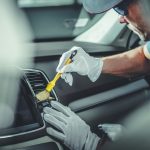How to Repair a Car’s Paint Scratches: DIY Tips for a Flawless Finish
Choosing Between DIY and Professional Repair
Deciding whether to repair a car’s paint scratches yourself or to seek help from an auto body shop can depend on several factors such as the severity of the scratch and your comfort with DIY tasks. Understanding both options can help you make a more informed decision.
Seeking Professional Help
Professional auto body shops possess specialized tools and extensive knowledge. They can handle a wide range of paint scratches, from minor surface marks to deep gouges that have reached the metal. Their expertise ensures that the color match and finish are seamless, maintaining the value and appearance of the car. While professional help can be costly, it often guarantees a high-quality result. If the vehicle has multiple scratches or if the paint damage is significant, seeking professional help can be the most efficient and effective solution.
Evaluating Scratch Repair Kits
Scratch repair kits cater to those looking to fix paint damage themselves. These kits typically include items like scratch remover compounds and applicators. They are best suited for minor scratches that affect only the top layer of paint. Using a scratch repair kit can be more cost-effective than visiting an auto body shop. However, the quality of the repair will depend largely on the product’s effectiveness and the user’s skill. For minor and less-visible scratches, a scratch repair kit can be adequate, but for deeper or more prominent damage, reconsidering professional assistance might be wise.
Understanding the Cost Implications
Repairing car paint scratches yourself can save a substantial amount of money compared to seeking professional help. The cost of DIY paint repair kits typically ranges from $20 to $50. These kits usually contain everything you need, including sandpaper, compound, and touch-up paint.
Professional repairs, on the other hand, can be significantly more expensive. Depending on the severity of the scratch, professional services might cost anywhere from $150 to $500. For deeper scrapes or multiple scratches, the cost could rise even higher.
The value of your car plays a critical role in your decision-making. If the car has high resale value or is a luxury model, investing in professional services may be worth it. This ensures a near-perfect finish that could help maintain or even enhance the car’s value.
For older vehicles or those with lower resale value, DIY repairs might be preferable. The savings can be reinvested in other maintenance tasks, providing a balanced approach to car upkeep. While DIY methods can be effective, the quality of the result will depend heavily on your skill and the extent of the damage.
Deciding between DIY and professional repair also involves considering time. DIY repairs require a few hours of effort, while professional services can get the job done quicker, though at a higher cost.
Understanding these cost implications can guide you in making an informed decision tailored to your specific situation.



